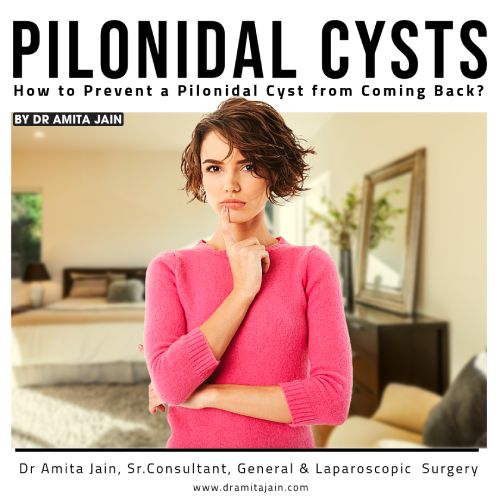Nobody wants to fall sick again and again, but sometimes infections recur due to various reasons. For example, many individuals treated for a pilonidal cyst will experience a recurrence at some point in their lives. While there may not be any foolproof way to prevent these flare-ups, certain precautions or preventive measures can be adopted, as explained in this article by India’s leading general and laparoscopic surgeon for pilonidal cysts Dr Amita Jain.
What is a Pilonidal Cyst?
It is a pocket of tissue usually formed at the bottom of the tailbone containing hair and skin debris. They can cause discomfort and recurrent infections.
What are the causes of Pilonidal cyst recurrence?
- Firstly, during the initial surgery, doctors might miss a second tract, which can later cause problems.
- Sometimes, patients get new pilonidal cysts due to the same factors causing the first one, like pressure on the buttocks and hair penetrating the skin.
- If lifestyle changes aren’t made to prevent the disease, another cyst can develop.
- Even after surgery, if your body doesn’t heal properly, you may still experience issues from the cyst.
Some of the major risk factors that cause the recurrence of painful pilonidal cysts are obesity, hormonal fluctuations, lack of an active lifestyle, presence of excess hair growth near the natal cleft, use of tight-fitting clothes that push the hair growing in the area into the pits of the skin.
What are the Ways to Avoid Pilonidal cyst Recurrence?
You may do the following to avoid the recurrence of the pilonidal cysts:
Hair Removal: Excessive hair growth in the sacral area is a significant factor in the development and recurrence of pilonidal sinuses. The presence of hair in the natal cleft can lead to ingrown hairs and the formation of abscesses. To prevent this, it’s recommended to remove hair from the sacral area if prone to pilonidal cysts. This reduces the risk of hair becoming trapped in the base of pilonidal wounds, which often occur. There are various methods of hair removal for this purpose:
- Weekly shaving is advised to complement surgical treatments. It helps prevent hair from entering the cyst and reduces the likelihood of recurrence.
- Depilatory creams can chemically dissolve hair, allowing for easy removal. Although they provide temporary hair removal, they can be convenient for some individuals.
- Laser epilation, performed after surgery for the pilonidal sinus, decreases the chance of recurrence. This method destroys hair follicles using light energy absorbed by melanin in dark hair. It’s a safe and straightforward procedure where short pulses of light treat multiple hair follicles within a targeted area.
Maintain Good Hygiene: Proper hygiene prevents the recurrence of pilonidal cysts. Regularly washing the area with mild soap removes debris and reduces bacterial growth. Gently patting the skin dry after washing prevents moisture buildup. Avoiding oils and herbal products, using glycerin soap, and prompt showering after sweating minimize the risk of infection, promoting overall cleanliness and skin health.
Active Lifestyle: Since obesity is a risk factor for developing pilonidal cysts, an active lifestyle can help you lose weight.
Don’t Sit For Prolonged Period: Avoid sitting for long periods as sweat and dirt may collect in the natal cleft. Taking frequent breaks to stand and move around helps reduce the constant pressure and friction around the tailbone. This proactive approach minimizes the likelihood of cyst formation and alleviates excessive strain on the coccyx region.
Regular Medical Check-ups: Keep checking the area around the initial pilonidal cyst. In case, of any noticeable lump or redness and any other symptom, it should be immediately examined by the doctor.
The Right Treatment: Choosing the most effective treatment for your specific case of pilonidal sinus can significantly increase your chances of long-term success. Laser ablation of the sinus tract, for instance, is a great option with a recurrence rate as low as 2.9%, according to scientific research.
Don’t hesitate to take proactive steps to prevent recurrent pilonidal cysts. Regular hair removal, hygiene maintenance, an active lifestyle, avoiding prolonged sitting, and choosing the right treatment can significantly reduce the chances of recurrence.

Dr Amita Jain is one of India’s most distinguished and experienced senior surgeons who has conducted more than 1,00,000 successful surgeries, and has covered a wide spectrum of general and minimally invasive procedures. Dr Amita Jain is refered as the pioneer surgeon in the fields of Gallbladder stone removal surgery, appendix removal surgery, hernia repair surgery, Pilonidal Sinus treatments, varicose vein and piles surgery, fistula surgery and fissure surgeries.
With an outstanding career spanning over 29 years, Dr Amita Jain has earned her place among the top General and Laparoscopic surgeons in Delhi and India, known for her precision, compassion, and consistent surgical excellence. She was the Professor of Surgery at the Army College of Medical Sciences and Base Hospital, Delhi Cantt. In 1994, she was commissioned as a surgeon under the United Nations Mission in Congo.
Dr Amita Jain currently serves as the Head of Department and Senior Consultant for General, Laparoscopic and Trauma Surgery at Artemis Lite Hospital, Rosewalk – Luxury Maternity Hospital in Delhi (Panchsheel Park, Delhi) and Rainbow Children Hospitals (Malviya Nagar, Delhi).
